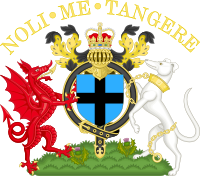Kingdom of Loquntia
Kingdom of Loquntia Reino Locunteño | |
|---|---|
| Motto: "A Quirky Little Force for Good",
"Rex Publicus et Res Publica" (Latin: The People's King and the People's Thing) | |
| Anthem: "The Liberty Bell" - John Philip Sousa | |
| File:North America | |
| Capital | The Principality of Norling |
| Largest city | Bambino |
| Official languages | English, Spanish |
| Demonym(s) | Loquntian, Locunteño |
| Government | Constitutional Monarchy |
• The Sovereign | HM King John I |
• Prime Minister | Nicholas Treviño |
| Legislature | The Parliament |
| Establishment | January 21, 2012 (Loquntia Day) |
| Population | |
• (2015 Estimation) census | 30 |
| Currency | Loquntian Crown (c.), U.S. Dollar ($) |
| Time zone | Central Standard Time (UTC+6 Sierra) |
Website Email (for official communications only) | |
The Kingdom of Loquntia is a sovereign micronation founded in 2012 by its current King and his friends in an 8th-grade algebra classroom. Originally an autocratic dictatorship, several constitutional reforms have occurred and the current Charter of Loquntia ratified in 2019 limited the power of the Sovereign and much more clearly defined the role played by the Loquntian government.
History
Activity of the Loquntian government and its monarch peaked in 2012, 2014-2016, and 2019-2021. International relations became strained when Loquntia was involved in several disputes involving its citizen Ava Neasa, and New Starland, wherein King John was accused of using subterfuge to take over autocratic control the Kermadec Union (see DSL Legacy). These disputes have caused the Grand Unified Micronational (GUM) treaty organization to lose confidence in Loquntia.
After a long period of inactivity while the King was attending college, a Charter of Loquntia was passed in 2019 cementing various rights and freedoms. A bolus of legislation was drafted and passed from 2019-2021 including reforms to the state's justice and electoral systems, as well as providing for several new state publications to enhance government transparency.
Government[1]
Loquntia is a constitutional monarchy with a unicameral parliament inspired by the Westminster System. Each year a prime minister is elected, although removable at leisure by Parliament. Each territory in Loquntia can have one elected Member Temporal and one Member Spiritual appointed by the Sovereign. This reflects a dichotomy of power which also extends to the military and the justiciary. The Prime Minister has the authority to elect a Minister of Defence to promulgate rules and govern the armed forces, but only the Sovereign can commission officers who can enlist, promote, or dismiss personnel and give the orders to use force. Meanwhile in the justiciary the Prime Minister can appoint a Solicitor-General to be state counsel, but only the Sovereign can “call justices to the bar”.
Elections are held every year from 1 November to 30 November, during which ballots may be cast by registered voters who submitted a Census form between 1 January to 30 September of that same year.[2] The first election under this scheme was held in 2021, and only one person was registered to vote, and he voted for himself.
Administrative Cabinet
The Prime Minister is in charge of the Cabinet — the national administrative government. They have the authority to promulgate and enforce regulations called “administrative rules”. These rules must reflect a power granted by the Charter of Loquntia or by a statute. They also must be published in the national gazette, the Official Bulletin. The below table describes each office of the Cabinet.
| Office | Acronym/Symbol | Head | Purpose |
|---|---|---|---|
| Ministry of Defence | MD, ♣ | Minister of Defence (appointed by Prime Minister, Commander-in-Chief (appointed by the Sovereign) | National defence, law enforcement, emergency rescue, logistics |
| Ministry of the Exchequer | MEX, ♦ | Chancellor of the Exchequer | Government finance, regulating trade & commerce, levying taxes & tariffs |
| Ministry of Foreign Affairs | MFA. ♠ | Minister of Foreign Affairs | International relations, citizenship, identification documents, collection of import duties & tariffs |
| Ministry of the Interior | MI, ♥ | Minister of the Interior | Public health & safety, agriculture, census & elections, police & law enforcement, transport |
| Library of Blue Ink | LBI | Chancellor of the Library of Blue Ink | Recordkeeping & national archives, education, state publications |
| National Bank of Loquntia | NBL | Chancellor of the National Bank of Loquntia | Issuing currency, monetary policy, commercial & investment banking |
Legislature
At the national level, Loquntia has a unicameral Parliament of members, representing each territory. Each territory can have one elected member and one member appointed by the Sovereign. While this system can create a great deal of political discourse, it is a very close-knit community, so very few actually vote. There are no political parties in Loquntia, and as of December 2021, the territory that holds the seat of government—Norling—has both seats vacant. There are already plans for reforms to be made in 2022 under the Canfield Administration to make public auditing of elections easier, realizing the Sovereign’s desires for a more democratic system expressed in his 1 April speech to Parliament.[3]
Primary Legislation – Statutes
Primary national legislation in Loquntia consists of letters patent issued by the Sovereign and Acts passed by Parliament which receive royal assent. Every piece of primary legislation is referred to as a statute. All of these pieces of public legislation are available in the Statutes at Large published by the Library of Blue Ink. Non-ephemeral public statutes are also published in the Revised States which is organized my subject matter title for easier reference. The most important piece of primary legislation is the Charter of Loquntia, which can be found in Title 1 of the Revised Statutes.[4] It is the primary constitutional document of Loquntia and it makes provisions for human rights, as well as administrative, legislative, and judicial powers. Territories have the authority to establish an elected council to pass byelaws and manage administrative appointments. As of December 2021, only Bambino has a council chartered, and it never sits.
Secondary Legislation – Administrative Rules
Secondary legislation in Loquntia consists of rules and regulations issued by the executive branch of government. These laws are called administrative rules. These rules are created by the ministries of government themselves using powers they are given in the Charter of Loquntia or in statutes. National laws supersede administrative rules if they are ever contradictory. New rules and proposals for rules are published in a periodical called the Official Bulletin (OB). The OB also publishes announcements for public discussion of rules, as well as reports, orders, directives, and advisories issued by the administrative government. Public rules are codified in the Code of Regulation which is organized by subject matter titles. Note that the Code of Regulation isn't organized exactly like the Revised Statutes although some subject matter titles overlap.
Other Sources of Law
In addition to administrative rules, territories, provinces, and municipalities have their own charters (which are effectively primary legislation) and issue their own ordinances (with the authority of secondary legislation). Legislation at the national level supersedes all inferior jurisdictions.
Treaties
The Kingdom of Loquntia has entered into several treaties governing international relationships. Generally, international relationships are governed by the precepts set forth in Title 4 Chapter 1 of the Revised Statutes.[5] Some treaties were passed before these provisions were adopted but the new provisions generally prevail.
Justiciary
The justice system in Loquntia is referred to as the Justiciary, and the courts are one of the most important institutions in the Justiciary. Loquntia is a mixed common law and civil law jurisdiction. Loquntian citizens have a lot of rights set forth in the Charter and in law. At the beginning a court proceeding, the judge must briefly explain the proceeding to the defendant, read them their rights, and answer any questions they may have about the law and procedure. This introduction is called a Notice of Proceedings.
"You may refuse to answer any question or give any testimony which may be used to incriminate you. You also have the right to review any evidence against you at your request, and to cross-examine any witnesses against you or call any witnesses before the court to testify on your behalf. You are presumed innocent until proven otherwise."
The above message is given to anyone being questioned, detained, arrested, issued a fine, sued, or who appears in court as a defendant. This practice was inspired the Miranda Rights tradition in the United States. Additionally, anyone who has been summoned to appear before an administrative board or parliamentary committee has the right to have a hearing with a judge beforehand to determine if the summons is legal. This sort of summons is called an administrative referral.
Supreme Court
The Supreme Court of Loquntia is the court of last resort in the Loquntian appeals system. It also has original jurisdiction to try all cases in Loquntia where no other court is available.
Provincial Sheriff's Courts (High Courts)
Each territory or province can have its own High Court and the presiding judge is called a Sheriff. Some provinces may share a court or share judges and this is referred to as a High Sheriff's Court. Sheriff's courts can try all civil and criminal cases in their jurisdiction, as well as handling most administrative cases.
Justices of the Peace
Municipalities and townships within Loquntia can form their own Justice of the Peace (JP). JPs have the authority to try all minor crimes — summary offences and some indictable offences, but only when the crime isn't as serious as a normal indictable offence. JPs also have jurisdiction over civil suits where the amount in controversy does not exceed 40 crown ($800 USD).
Courts of the Exchequer
Exchequer's courts are small claims courts that the Ministry of the Exchequer can form and their goal is to settle disputes where the amount in controversy does not exceed 40 crown ($800). Exchequer's courts are there in case there aren't enough Justices of the Peace, and sometimes their rulings can be issued without a hearing.
Courts Martial
Courts martial are used only to try certain military cases. Any penalty issued by a court martial may be appealed to the Supreme Court of Loquntia. There are two types of courts martial: standing courts martial which have been permanently formed by the Ministry of Defence, and special courts martial which are formed under extraordinary circumstances or when the defendant is a commissioned officer.
International Relations
Immigration
Immigration by aliens into the territories of Bambino and Norling is currently prohibited without an invitation or express-written passport receiving a diplomat.
Naturalization
Any person can become a naturalized Loquntian citizen by receiving a naturalization certificate from the Sovereign or the Ministry of Foreign Affairs. An application must be submitted containing certain identifying a biometric information used for background checks.
Diplomatic Affairs
The Loquntian Ministry of Foreign Affairs maintains a Diplomatic Whitelist and Blacklist of nations to reflect the current administrations attitude towards developing a relationship with certain states and princes. Additionally, the treaty provisions that Loquntia has ratified the most in the past have been codified in its Revised Statutes, including some reciprocity agreements.
Treaties
| Nation | Relationship | Status |
|---|---|---|
 Republic of Sandy Glinka |
Mutual Recognition, Extradition, Allied | Mutually Effective Since Friday, Jun. 26, 2015 at 11:34 AM |
 Soviet Socialist Union of the Wakatipu |
Mutual Recognition, Extradition, Mutual Defence, Partially Politically Incompatible | Mutually Effective Since Wednesday, May 13, 2015 at 3:45 AM |
 Universal Triumvirate |
Pioneers of Mutual Defence and Peace Pact (MDPP) | Mutually Effective Since Friday, Feb. 26, 2016 at 11:24 AM |
 Shorewellese Empire |
Mutual Recognition, Allied | Mutually Effective Since Monday, Jun. 13, 2016 |

